The St. Petersburg City Court, having considered an appeal, has left in custody 31-year-old Aleksandra Skochilenko, a St. Petersburg painter, musician and videographer who had been arrested more than a month ago for having replaced supermarket price tags with phrases describing the actions of the Russian Armed Forces on Ukrainian territory. According to a new article of the Russian Criminal Code, she faces between five and ten years in prison for what the Russian authorities consider «fake».

Aleksandra Skochilenko. Photo is a courtesy of Sofya Subbotina
One in a million
Sasha was detained on 11th April. On 13th April, the district court ordered her detention in a pre-trial cell until 31th May. The defendant and her defence appealed against this preventive measure in the City Court on 17th May. Judge Vladimir Vasyukov, who was examining the appeal, declared the hearing closed almost immediately. Neither listeners nor the press were allowed into the courtroom until the verdict was announced. Aleksandra was not brought to the hearing either, on the promise to ensure her presence by video conference. But, as explained by court staff, the Internet worked so poorly that Skochilenko could neither see nor hear those who came to support her, while that was at least one hundred people — both friends and acquaintances of Sasha and just sympathizing citizens of St. Petersburg. It was enough just to turn around one camera in the courtroom in order to allow the accused to see their faces,. The audience asked for this three times, but their requests were refused. Skochilenko as well received a refusal to change the preventive measure from Vasyukov.
The idea to replace the supermarket price tags with the anti-war leaflets with a similar design was not Aleksandra’s. This anti-war campaign was conceived by members of “Feminist anti-war resistance”. In March they published in their Telegram channel a ready-to-print layout along with some security tips: do not stay under the supermarket cameras, pay only in cash, leave quickly. However, it turned out that these security measures do not save the campaigners.
Skochilenko was the first person in Saint Petersburg to be arrested for a pacifist act. As for today there are seven people in Russia arrested for replacing the price labels.
Aleksandra is one of the only two Russian citizens to face not an administrative case for discrediting Russian armed forces, but a criminal case for “disseminating knowingly false information”.
“Sasha was straightly accused for a criminal offence because the price tags she left at the supermarket did not contain slogans or appeals against the war, but the information that literally read: «Russian army bombed the art school in Mariupol. Around four hundred people were hiding in it from shooting», in other words, statements about the actions allegedly committed by the Russian army," Skochilenko's lawyer Dmitriy Gerasimov explained.
Both Sasha herself and her friends are surprised by the fact that she is under investigation not for her posts on social media, her anti-war “Peace jams”, creative meetings that could be attended by anyone willing to play or listen to music, but for the smallest, in Skochilenko’s view, act of protest against Russian invasion in Ukraine.
Who is Sasha Skochilenko, considered by Russian authorities a dangerous criminal threatening the whole army of an immense country?

Aleksandra Skochilenko, photo is a courtesy of Sofya Subbotina
“That Sasha, what a girl!”
Painter, musician, videographer — first of all, but not only.
“In my short life (Alexandra is now 31 — author’s note) I’ve worked in many places,” Sasha wrote about herself on social media in 2020. “At the age of 17 I entered a theatre academy to study direction, because I loved playing music, drawing and acting (I thought that all these things make up the directing profession), but I ended up studying till the fifth year and then left in order to graduate elsewhere without losing my right to study for free. I took my exams at Saint Petersburg State University and got into the Faculty of Liberal Arts and Sciences where I studied anthropology. I graduated with honours, and I even thought about pursuing an academic career, but then I’ve chosen a different path. For many years I worked as a videographer and film editor. I don't have any particular profession; I used to work as a painter, cartoonist, actress and many others. I don't want to have any particular profession. In fact, I don't have one.”
Sasha doesn't make secret of the fact that she “was born in a most poor family,” lived in a communal apartment in Vasilyevsky Ostrov, a district of St. Petersburg, and used to work as a nanny and as a courier. She learned how to do household repairs, put up plasterboard ceilings, priming and painting walls, laying wiring and many other.
Aleksandra has suffered from psychological problems since her early years. A couple of years ago she was diagnosed with bipolar affective disorder, which she declared in court in April.
Skochilenko described her experience of living with a mental disease in a book called A book about depression – a comic in which a girl called Sasha shares her own story of struggle with depressive episodes and bipolar affective disease. After the book was published online and then in print, the artist received a lot of grateful feedback from the readers. A book about depression was translated in Ukranian, English and Spanish and its author received invitations to thematic festivals, round tables, presentations and seminars. According to people who know Skochilenko, the book that she published in 2014 was a real breakthrough, at that time mental illness had not been talked about openly in the internet.
“Discussing mental illness back then was much more stigmatised than it is today. That stigma has become smaller, thanks in part to Sasha's efforts, her book on depression and her frank conversations with people," says Aleksey Belozerov, a close friend of the girl, editor, videographer and former coordinator of “Observers of St. Petersburg”, a non-governmental organization of election observers.
In the following years Skochilenko published other books on mental health issues What is Mania? and I Have Never Been Loved which were equally successful with audiences.
“As all the common people”
“Could I ever have imagined that one day I would be slipping a package- through the window of a pre-trial detention centre?” Aleksey Belozerov reflects. “Although now I am even embarrassed that I’ve never done anything like that for anyone before, when I see such tremendous support for Aleksandra now. It's just that if you are in touch with Sasha, you find yourself in places and situations in which you wouldn’t have never found yourself on your own initiative. It was like this back in 2011 as well. Sasha was filming a lecture of Aleksandra Krylenkova, the founder of the NGO “Observers of St. Petersburg”. She showed me the recording, and on 4th March 2012 she and I were election observers. On 5th March started the protests on St. Isaac's Square, and on the same day the online newspaper Bumaga announced its launch. Sasha and I did some of the first reports about those protests for Bumaga. We filmed them on video, and then Sasha edited them into stories. Not news reports, but artistic ones, which was her idea. We did the same reports from Bolotnaya Square in Moscow in May 2012.
However, you can't say that Sasha went to those protests only for work while her own political views were different, or that she didn't care," Aleksey points out. “We didn't get any money for that. We worked because we thought that work was important.”
“Sasha is not a political activist at all,” says Arseniy Vesin, her old friend and the journalist of Ekho Moskvy radio station (Echo of Moscow in Russian, a commercial radio station taken off the air on 1st March 2022 by Russian authorities due to its coverage of the Russian invasion of Ukraine — translator’s note).
She is irritated and doesn't like things that all the common people don't like. As a sensitive and caring person, she feels strongly about things and tries to help in any way she can.
Sasha is good at making videos, so she often went to the protests more to film. Her main task had a constructive character. Her reports were watched by a lot of people. But she did not go to every picket and protest. When she thought it was necessary, she went. That was not the main activity in Sasha's life. The main thing for her was always music, drawings and cinema.”
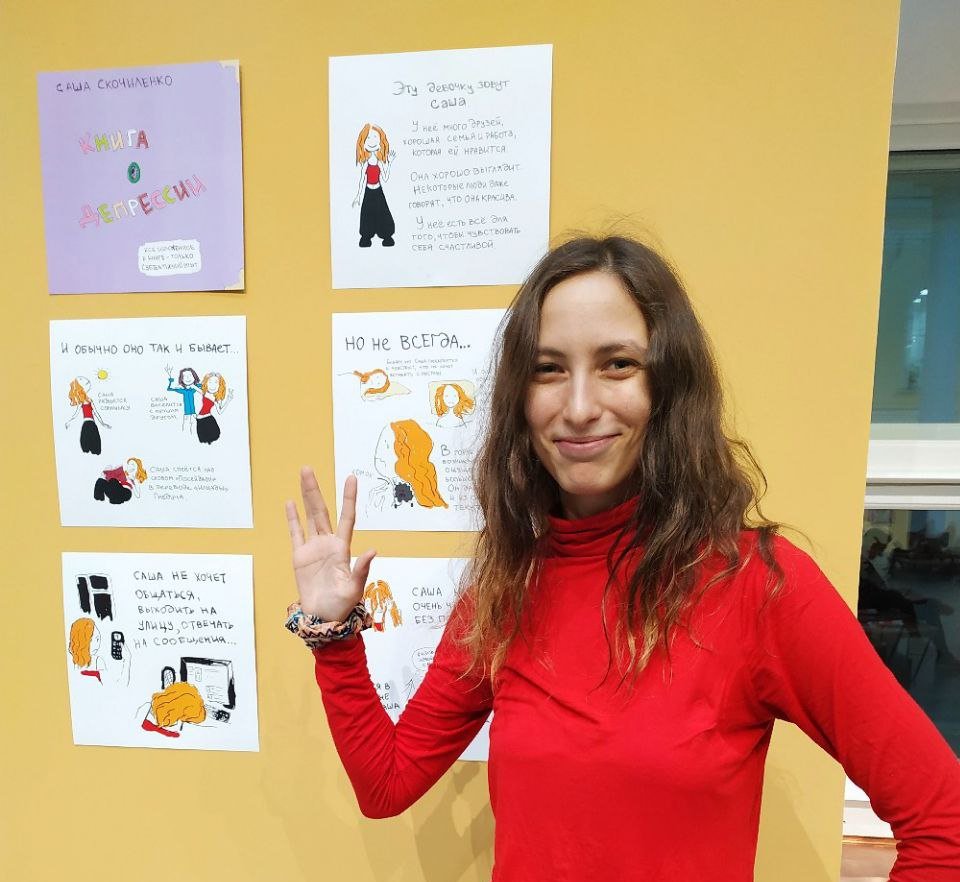
Photo is a courtesy of Sofya Subbotina
“Alexandra is a creative, bright, memorable, complex and interesting person," Aleksey Belozerov continues. “You can see it at first sight, you hear it from the first word she says when you talk with her. You constantly discover something new in her and it surprises you. I've known Sasha since 2005 — we were at school together — but this feeling has not left me even after all these years. Although I have been through a lot, Sasha never ceases to amaze me. Everything has changed during this time: the world, the country, us. And Sasha continues to live her art as she always used to. For her, creativity is an act of transforming reality. Changing herself and her life for the better. If you can do it with a song, fine; if you can do it with a drawing, fine; if you can do it by replacing price tags in a shop with anti-war leaflets, fine too.”
“Help, they are bombing us”
“On the morning of 24 February, when Putin announced the start of the «special operation» in Ukraine, we spoke with Sasha by telephone and realised that we wanted to go to the centre of St. Petersburg for an anti-war rally, because it was simply impossible not to do this!” Sofya Subbotina, Aleksandra's girlfriend, recalls. “It was especially painful for Sasha as she had many good friends in Ukraine. In the winter of 2019-2020, Sasha, at the invitation of a former classmate, a filmmaker from Ukraine, Svetlana Pogasiy, travelled to the Carpathians to teach children in a children's film school. Now they were hiding from the bombings in the underground and reporting back to her.”
«I taught children in a winter children’s camp in Ukraine to make videos, I remember everyone’s face. They are no different from the children I see in Russia. And I’m scared, I’m hurt, I’m terrified that bombs are falling on them today,» Skochilenko wrote on social media in February.
According to Sasha's friends, her friends from Ukraine called her from the bomb shelters asking «How could this happen? How could you let this happen? Do something, help us, they are bombing us».
No one knows exactly how many times Skochilenko went to anti-war protests in the centre of St. Petersburg. On 3 March Aleksandra was arrested there. She was held overnight in a «monkey house» (in Russian slang stands for “temporary detention centre” — translator’s note) and the next morning she was taken to court, found guilty and fined 10,000 roubles.
On this occasion the artist wrote on social media: "It's very scary in Russia. The worst thing is not even that you are guaranteed to end up in a police van for speaking out against a war that you don't support. And it's not that they torture detainees in our police stations. And not that if you call a war a war, you may now receive a criminal record…
The worst thing is that some of our compatriots really don't understand the value of human life, they support violence and find value in it.”
A guy and a girl — first year law students — came to the City Court on 17 May and stayed away from Sasha's support group. They explained to the correspondents of Novaya Gazeta. Europe: «Not everyone came to stand up for Skochilenko. There's a crime in her actions. We are here because we are curious about the process».
Silent protest
“In mid-March, a movement called the “silent protest” began to spread in Russia," Sofya continues. “People invented price tag replacements and many others: women in black with flowers, graffiti on the walls, flyers posted all over the city. It seemed safer than going out to street actions. I think Sasha also adopted this form of protest for herself.
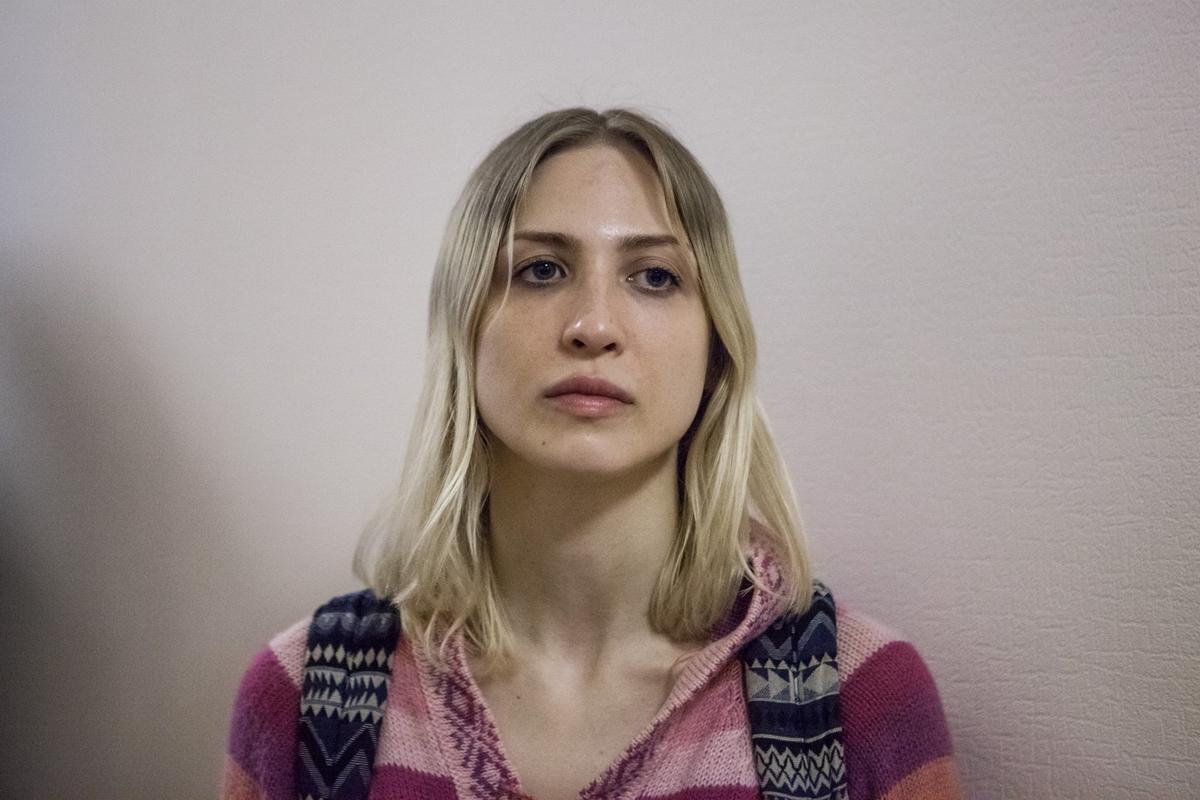
Sofya Subbotina, photo by Elena Rodina for Novaya Gazeta. Europe
Shortly before her arrest, Skochilenko had drawn a series of anti-war postcards («Love is stronger than war and death», «Cheer up, we'll live again in peacetime», «Human life has no price», etc.). She did not have time to print them, to put them somewhere, for example, on the shelves in the shops. According to her friends, she had such an idea, since the shops are frequented by the people who do not receive any truthful information about the special operation, but only what is poured out at them from the TV.
Sasha didnt’t discuss her act of replacing the price labels with her friends or acquaintances. They think that she didn’t give it much importance.
“There was no special action," Aleksey Belozerov is convinced. “I can explain how it all happened. Sasha saw these price tags on the internet and decided: wow, cool! She printed them out on her home printer. She cut them up with scissors. Put the pack in her pocket and forgot about it. Went back and forth. One day she stopped on the way to a shop near the house to get a chocolate bar. Put her hand in her pocket, came across the price tags. Left a few on the shelves, bought a chocolate bar and left. She didn't take it as anything particularly serious. Just another creative transformation of reality she could make. Why not?”
“I left those miserable four price tags in the shop in a hurry between work, rehearsal and music jam,” wrote Skochilenko herself while she was already in the temporary detention centre in April.
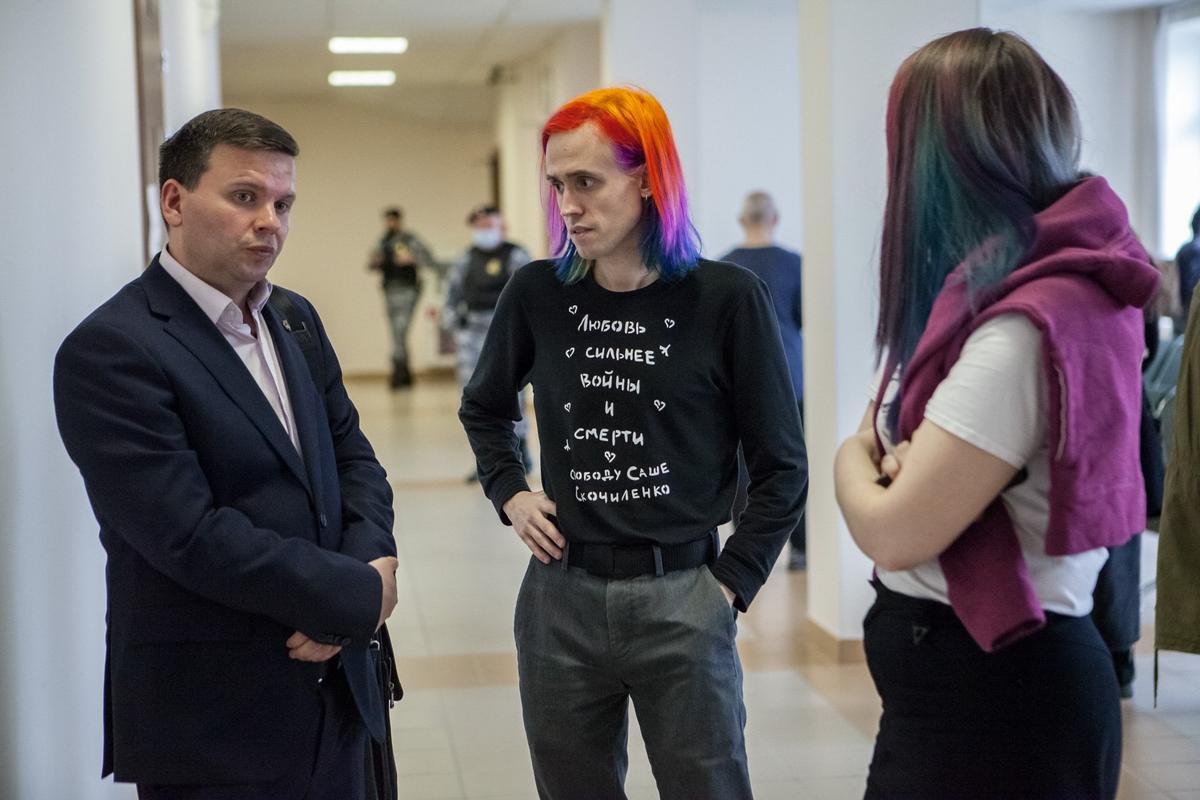
Dmitriy Gerasimov (left) and Aleksey Belozerov (centre) in the court. Photo by Elena Rodina special for Novaya Gazeta. Europe
«Political hatred»
On 31 March a 72-year-old pensioner came across the anti-war price tags which Skochilenko had left instead of the original ones in the Perekrestok supermarket on Maliy Prospekt (Vasilyevsky Ostrov district). According to the investigation, it was she who reported to law enforcement authorities that «deliberate lies» were being spread in the supermarket. «Our soldiers would not allow the bombing of peaceful civilian objects such as an art school… I am worried about our soldiers and I am outraged by such slander against them. My hands were even shaking with indignation,» the elderly woman wrote in her statement.
On 11 April, Alexandra was arrested in the flat of an acquaintance on Vasilyevsky Ostrov. The flat where she lives with Sofya Subbotina was under perquisition. The police took away the computers and a printer on which the price tags had allegedly been made and printed. Initially the criminal case against Skochilenko was initiated under art. 207.3 part 1 of the Russian Criminal Code «Public dissemination of knowingly false information on the use of the Russian Armed Forces». But then it was re-qualified under Article 207.3 part 2 of the Criminal Code, aggravating Sasha's crime by the fact that she allegedly committed it out of «political hatred» motive.
«Aleksandra does not deny that she replaced the price tags in the shop,» comments lawyer Dmitriy Gerasimov. “But the law says: « disseminating knowingly false information». In other words, a person must know in advance that the information is false and he or she is spreading it. But Sasha claims that she thought this information to be true, because she had read various independent sources, which claimed these facts. Plus she received information from her friends in Ukraine and believed it to be true.
On 13th April Dmitriy Gerasimov asked in court to release Sasha putting her under house arrest: the girl has a severe genetic illness — coeliac disease (gluten intolerance), she needs a special diet, which is difficult to provide in the conditions of the pre-trial detention facility. Not observing the diet could have serious health consequences, including cancer and death. However, Judge Elena Leonova of the Vasilyevsky Ostrov District Court refused the defence claim and sent Skochilenko to a cell.
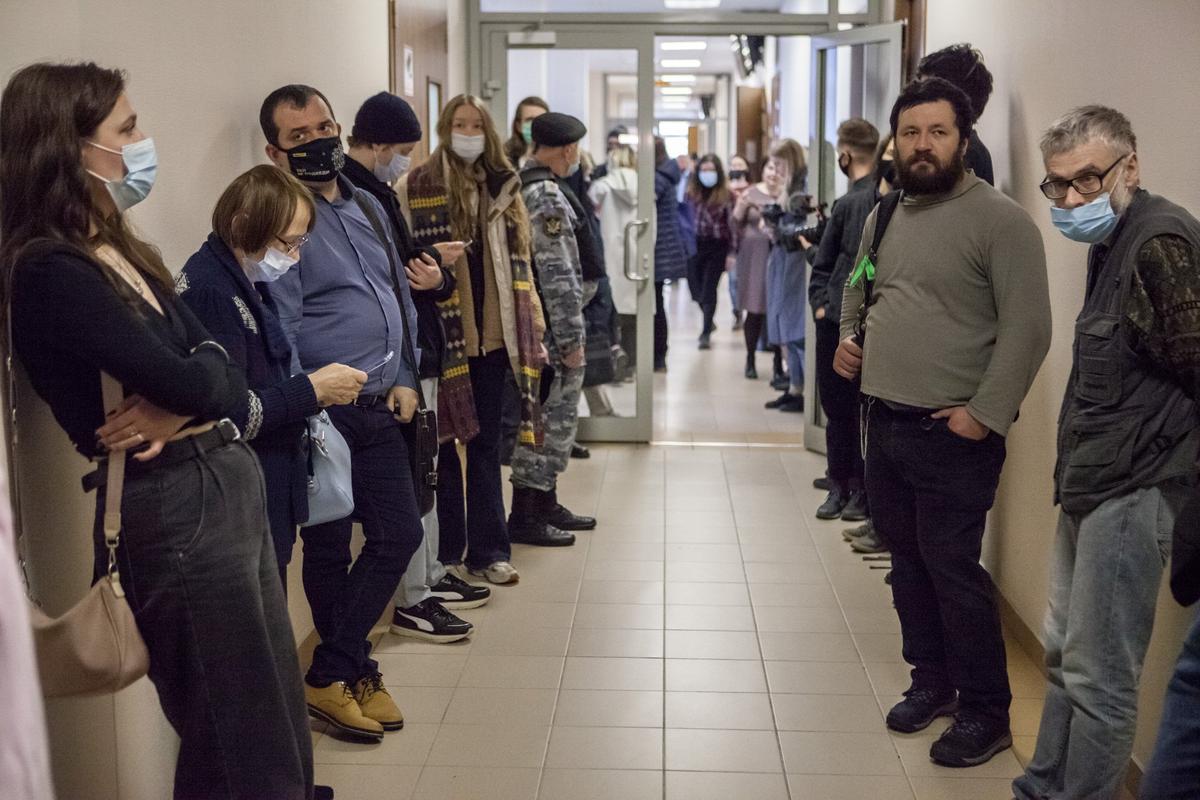
Before the hearing of 17th May. Photo by Elena Rodina / Special for Novaya Gazeta Europe
Everything’s all right, no complaints
For the first few days in detention, Sasha had to starve. On 11th April her friends brought her some food appropriate for her diet and warm clothes. However, at the court hearing on 13th April Skochilenko said that the package had not reached her and she had not eaten anything for the last 48 hours.
After the trial, Sasha was transferred to the Pre-Trial Detention Centre no. 5, where she was first placed in an eighteen-bed cell, then in a six-bed cell, but the conditions only worsened. On 5 May Subbotina knew that Aleksandra was being chased by her cellmates.
“Although such rule doesn’t exist in the pre-trial detention centre, Sasha is allowed to eat and drink tea only when breakfast, lunch and dinner are scheduled" said Sofya. “One day Sasha had a medical visit at the breakfast time, and when she returned to her cell, the senior cellmate told her not to eat before dinner. Because of the limited space in the cell, the senior cellmate forces Sasha to throw away some of the food she receives.
Sasha is not allowed to open the fridge by herself, has limited access to the rest of the food as it is stocked under the senior’s bed.”
Initially Skochilenko was put under psychological pressure by the senior cellmate, who later was joined by the others. Sasha was constantly told that she smelled bad. Cellmates forced Sasha to wash all her clothes every day, including bulky jumpers and the warm dressing gown. Sasha was constantly harassed by the senior cellmate who told her how many times she must fold the cloth when washing the floor, by which side she had hold the broom, and which edge she had to start sweeping the room from.
Her friends complained to the administration of Pre-Trial Detention Centre no. 5 and to the administration of the Department of the Federal Penitentiary Service in St. Petersburg and the Leningrad Region, but with no success. They managed to contact the St. Petersburg ombudsman Svetlana Agapitova and the head of the Human Rights Council Valery Fadeev. After 9th May Sasha was transferred to a two-bed cell with a friendly neighbour. And a gluten-free diet was provided not only for Skochilenko, but also for another prisoner, also suffering from coeliac disease, for whom Alexandra stepped in.
“We didn't expect such coverage, such response, such huge support of Sasha«, say friends of the investigated girl. »A huge number of people, both acquaintances and strangers, offer their help and assistance. They are sending packages, transcribing interviews, writing and translating texts into English, running Telegram channels and websites, and so on. There are people with all kinds of competencies in all kinds of fields.
On 11th Skochilenko wrote an open letter that she delivered through her lawyers: “Now I can finally breathe a little — I’ve left the difficult cells and now I am in a calm environment, where the lack of freedom and the isolation from my loved ones are the most fundamental issue (should a person under investigation and not even convicted be punished with something even greater than this for some reason?!). The improvement of my detention conditions has come about thanks to all of YOU! The other prisoners, who do not have the unprecedented support that you have given me, have a completely different prison experience. If I complain, I am immediately transferred to the best and most comfortable cells, and their complaints can only worsen their living conditions, their powerlessness is used against them because there is no one to stand up for them. At every inspection, their whole bodies shaking, they reply with the standard: «Everything is fine, no complaints».
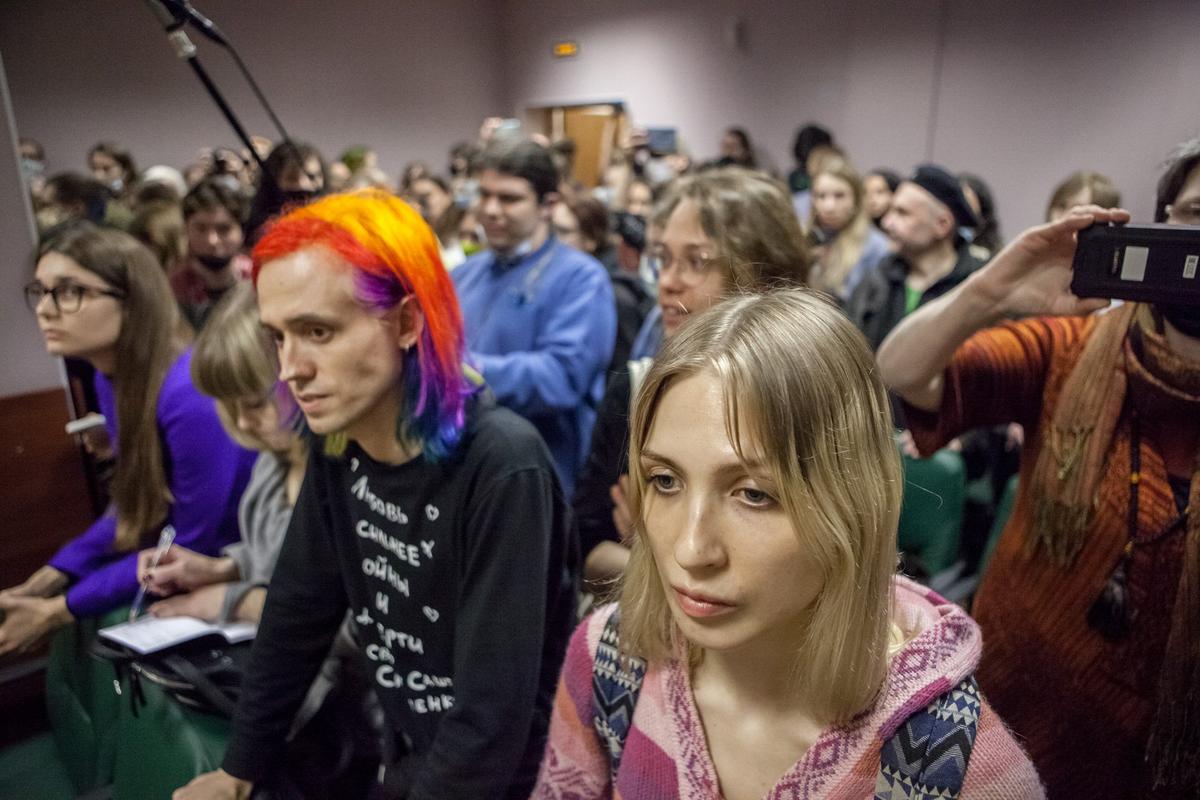
In the courtroom. Photo by Elena Rodina, special for Novaya Gazeta Europe
Two-sided outcry
“We haven’t seen each other since 13th April, we’ve been only sending letters,” Sofya can barely stop herself from crying. “Psychologically it is very difficult for Sasha. She often feels herself depressed. She wrote me that she can’t imagine what will be left of her if she spends ten years in a place like that. She thinks that she will forget who she is and what she used to do once.
The most severe punishment that Skochilenko faces is from five to ten years of imprisonment. A milder option is to pay a fine from three to five million roubles.
“We don’t know what to expect,” says Dmitriy Gerasimov.
In Russia there are no court convictions under this article of the Criminal Code yet. There is no experience to rely on. In court, we will be investigating whether Alexandra spread «knowingly false» information or not?
We will prove that she has no «political hatred». What hatred towards the Russian Federation?! Sasha loves her country, she was born here, she lives here. The charges were deliberately dragged to this more severe article in order to punish the person seriously, to flog her so that others would not be tempted to repeat.
According to the law, Sasha could be fined. But I don't think that will be the case," Arseniy Vesnin suggests. “I really hope that the outcry that has been created will influence the outcome of the case. But there is a downside to the public outcry. They need to show people: don't protest against the war.
“No one in the law enforcement bodies needed such publicity, such attention," believes Aleksey Belozerov. “I am sure that the Investigative Committee dreams of quickly sending the case to court and forgetting it like a nightmare. And the Federal Penitentiary Service, most likely, dreams that the trial takes place as soon as possible and sentences Sasha to a fine or probation. God forbid she should be sent to prison, and the Federal Penitentiary Service will have to deal with all this again! On the other hand, these are the law enforcement agencies. And how will the law-enforcement agencies show their weakness? Are they scared of some Sasha Skochilenko and a couple of intellectuals, who write absurd appeals? No, they are not. They will shut them down and pressure them. They will give him the utmost punishment and that’s it. Such development is also possible.
The investigators suggest to prosecute me for having spread some false information,” reasoned Skochilenko in her open letter, “but if this case had not been initiated, only one pensioner would have found out about this very information, who wrote a report on me, and because of the investigative actions a hundred thousand people from all over the world found out about it! According to this logic, my investigators themselves should have been tried under my article".
P.S.
Skochilenko's defence does not intend to appeal against the refusal of the St Petersburg City Court; it no longer makes sense. No later than 31st May, the Vasilyevsky Ostrov District Court must decide whether to extend Sasha's detention or to change her preventive measure. The painter’s lawyers are now preparing for this hearing.
Translated by Asia Aitmatova
